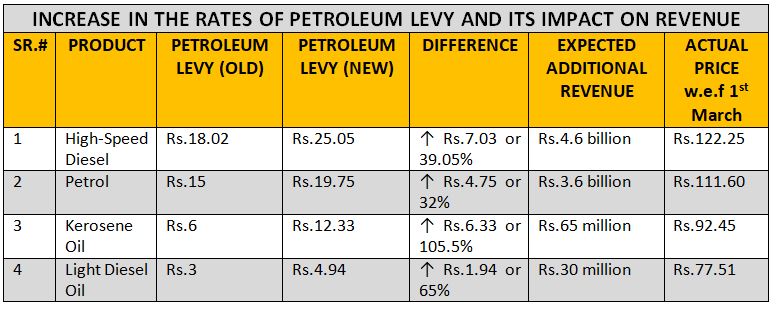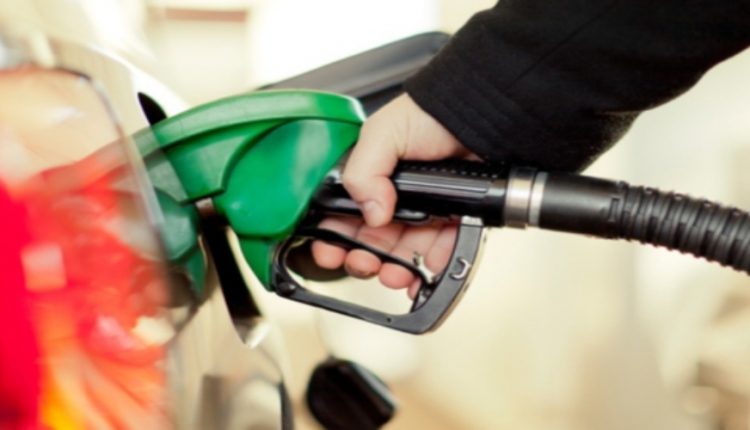In a bid to make up for the shortfall in revenue during the current fiscal year, the government has raised the petroleum levy by up to 106% that is expected to collect Rs.40 billion during the last four months till June 2020. According to the details, the global oil prices went down significantly last month owing to which Oil and Gas Regulatory Authority (OGRA) sent a summary to the Finance division for a comparatively marginal decrease in petroleum prices.
A reduction of Rs.5 per litre on the prices of petrol and diesel was approved by the Finance Ministry and the new prices came into effect from 1st March 2020.
At the same time, the government took advantage of this global price reduction as it aims to compensate its yearly target revenue by raising the petroleum levies. On High-speed diesel, the government increased the petroleum levy by Rs.7.03 from its old rate of Rs.18 per litre. The new rate of levy on HSD i.e. Rs.25.05 per litre is estimated to collect an additional Rs.4.6 billion per month.
Previously, OGRA proposed a price reduction of nearly Rs.12 per litre or 9.5% on high-speed diesel while the government slashed it by Rs.5 per litre which is equivalent to 3.9%. If the government had reduced the prices of HSD in accordance with the recommendation of OGRA, its price effective from 1st March would have been Rs.115.2 instead of Rs.122.25 per litre.
 Similarly, the petroleum levy on the price of petrol was raised by Rs.4.75 to Rs.19.75 per litre. As a result, the government will be able to achieve additional revenue of Rs.3.6 billion per month with this 32% increase in the tax amount. For petrol, the authority had proposed a reduction of Rs.9.76 per litre or 8.4% whereas only Rs.5 per litre or 4.29% rate was approved by the government. The reduced rate of petrol stands at Rs.111.60 per litre that would have been Rs.106.84 if the government had not worked out its revenue shortfall by increasing petroleum levies.
Similarly, the petroleum levy on the price of petrol was raised by Rs.4.75 to Rs.19.75 per litre. As a result, the government will be able to achieve additional revenue of Rs.3.6 billion per month with this 32% increase in the tax amount. For petrol, the authority had proposed a reduction of Rs.9.76 per litre or 8.4% whereas only Rs.5 per litre or 4.29% rate was approved by the government. The reduced rate of petrol stands at Rs.111.60 per litre that would have been Rs.106.84 if the government had not worked out its revenue shortfall by increasing petroleum levies.
In this way, the kerosene oil price was supposed to go down by Rs.13.33 per litre that eventually decreased by Rs.7 only. The levy on Light diesel oil (LDO) was increased by 65% to Rs.4.94 per litre from the old rate of Rs.3. This increase is expected to raise additional revenue of Rs.30 million each month.
The turns and twists in taxes:
It is pertinent to mention here that the crude oil prices in the international market went down by up to 19.35% whereas our government reduced the prices of petrol and diesel by approximately 4%. The government is facing a revenue shortfall of more than Rs.480 billion which is impossible to achieve in the remaining four months of the fiscal year 2019-20.
However, by doing so, the government will be able to make Rs.10 billion each month which will total up to Rs.40 billion by the end of June 2020. Also, the government is already charging a standard sales tax rate (GST) of 17% on petroleum products for the last year.
Until January 2019, these rates were broken down into 13% for high-speed diesel and 8% on petrol while kerosene oil and light diesel oil were being charged at 2% and 0.5%. Despite failing to achieve its target, the government has already collected 44% higher revenue on oil and gas products during the first half of FY 2019-20. Domestic production is facing a reduction of 10% while the imports have dropped by a considerable margin of 20%.
The petroleum products generate a major portion of the revenue to the national exchequer as their consumption is still growing particularly in the case of petrol and diesel. In Pakistan, the monthly consumption of petrol and diesel currently stands at 750,000 and 600,000 tons respectively.
What are your thoughts on the increase in petroleum levies despite a fair reduction in global price? Should the government pass on the impact of reduced global prices to the consumers in the future instead of raising its revenue? Let us know in your feedback and stay tuned to PakWheels for more updates.


